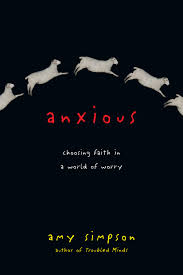 Amy Simpson, Anxious: Choosing Faith in a World of Worry (Downers Grove, IL: IVP Books, 2014). Paperback / Kindle
Amy Simpson, Anxious: Choosing Faith in a World of Worry (Downers Grove, IL: IVP Books, 2014). Paperback / Kindle
Tune in to the evening news, and you are likely to hear stories that cause fear and anxiety to well up within you. America’s struggling economy, the Ebola pandemic, radical Islamic terrorism. Or perhaps you don’t watch the evening news but still find yourself anxious about your spouse, your children, your job, your life.
Then you read Amy Simpson’s new book. It says: “a lifestyle of worry is incompatible with a life of faith.” And you think to yourself, Is this woman for real? Does she not understand the hard things I’m going through?
Yes, and yes. Amy Simpson is for real. She understands. She’s a wife, a mother, a worker. Her mother is schizophrenic. Her brother-in-law survived stage-3 liver cancer. Her husband is a licensed counselor. She wrote a book on mental illness. When she says that worry and faith are incompatible, she’s not saying it from some airy-fairy height untouched by trouble.
Rather, she says that faith and worry are incompatible because that is what Jesus himself says. “Therefore I tell you, do not worry about your life.” Doing so shows that we have “little faith” (Matt. 6:25, 30). The key question, then, is not whether world events and personal troubles make us anxious or afraid, but whether we turn to God in faith in the midst of such things.
At the outset of Anxious, Simpson makes some common-sense distinctions between fear, anxiety, and worry that are very helpful. “Unlike fear,” she writes, “worry is not an immediate response to real or perceived danger; it’s anticipatory, rooted in concern about something that may or may not happen. Unlike normal anxiety, it’s not an involuntary physical response but a pattern we choose to indulge. It rises not from outside us but from within.” Fear and anxiety happen; worry is a choice.
And because we choose it in the first place, we can unchoose it on second thought. Simpson offers two good reasons to do so:
First, worry hurts us and by extension, those we love. The longest chapter in Anxious is chapter 3, “Worry’s Many Destructive Powers.” It outlines the many mental, physical, and relational problems that worry causes. If you want to avoid those problems, avoid worry.
But second, worry is based on bad theology. You might be wondering what theology has to do with good mental health. Simpson’s husband is a cognitive-behavioral therapist. What this means is that he helps his clients understand how their beliefs shape the emotional problems they experience. Long before cognitive-behavioral therapy was a gleam in a psychologist’s eye, Jesus showed the connection between wrong beliefs and negative emotions. “Look at the birds of the air,” Jesus said, just after telling his disciples not to worry; “they do not sow or reap or store away in barns, and yet your heavenly Father feeds them. Are you not much more valuable than they?” (Matt. 6:26). Good theology contributes to good mental health.
Of course, good theology can’t stay in our minds. It must translate into action. Many of us affirm Jesus’ words with our heads, but they don’t trickle down into how our hearts feel or how our hands act. So, in chapters 6, 7, and 8, Simpson addresses “three things that keep us clinging to worry: a faulty perspective, a desire to possess and control the future, and a possessive attachment to the people and things of this world.” For me, these were the most challenging chapters of the book, revealing the subtle ways that my pride, control, and consumerism lie at the base of my worries.
Replacing worry with faith is not an easy thing, and Simpson doesn’t claim that it is. Throughout, she uses the language of process to describe the changes that need to take place, but also the language of repentance. Getting rid of worry is good mental health, but it is also a necessary spiritual practice. Our worry, driven by a desire to possess and control, comes between us and a God who alone is sovereign, and whose mercies alone can heal.
The book ends with a lovely statement about God that is worth sharing:
Why Trust God?
He never fails
He never leaves us
He never disappoints us
He loves us unconditionally
He’s the creator of all things
He transforms us from the inside
He forgives our sins
He knows everything
He rules the future
He is all-powerful
He is everywhere
He is good
He is great
He is
P.S. If you found my review helpful, please vote “Yes” on my Amazon.com review page.

